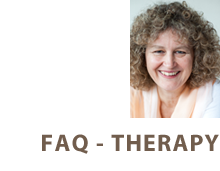
Read down to find the answers to some frequently asked questions related to psychotherapy. "Therapy" is used here as meaning "psychotherapy" but keep in mind that not all therapies are psychotherapies.
Example: The Alfred Tomatis listening therapy is psychotherapeutical within the context of a certified psychotherapy and when it is individualised to improve your specific mental health symptoms. The use of a training device at home could be therapeutic in helping improve attention or speech. However, and without psychological oversight within a psychotherapy it should by no means be used to treat psychopathological symptoms.
Read down to find the answers to some frequently asked questions related to psychotherapy.
What is psychotherapy?
Psychotherapy is a specific process which happens between a client and a therapist. In adults, therapy is an investigation between you who holds all the information and the therapist who has the knowledge to lead the process towards the clients' desired results through questions and specific interventions. In children it’s a little different and parents are actively included.
A lot has been written about types of therapies. Is the type of therapy chosen essential to the outcome?
Regardless of theoretical backgrounds, therapists who are felt to be “good” lead the process in similar ways, make similar interventions and share the same ethics. There are more than a hundred types of therapy and hundreds of therapists with different personalities, experience and styles. The main factor in the outcome is the therapeutic quality of the relationship established.
How long does it take to get better?
The length of therapy varies. It is unrealistic to expect to get better in a couple of weeks if you have suffered for years. Quick fixes are appealing but may not last. Very long and intense therapies requiring 3-4sessions/week over several years are meant to aid one understand and overcome deep and profound disabling inner psychological variables but are known to be unsuited for some disorders. In all other cases, the length varies according to your level of need, the complexity of your situation and the goals you wish to achieve.
What happens in therapy?
Therapy evolves in three phases: the start is essentially focused on information; the middle phase feels as though one is evolving from insight to insight and the third phase emerges when a relatively stable comfort zone has been reached. Insights are elating for they touch mind, heart, body and impact behaviour. They give a sense that evolution and progress is possible. They differ from intellectual knowledge.
Once the client has completed a therapy, is he cured ?
A completed therapy does not vaccine for good against the impact of new difficulties. As life unfolds in complex, unpredictable and unexpected ways, new situations may overwhelm again. Besides teaching humility, each difficulty can be faced as a learning opportunity. There is no shame in asking for help again.
When should someone seek therapy?
When it feels urgent to find a private and neutral space to sort things out, to find your own path towards your own goals, i.e. when you need to:
OVERCOME blockages, anger, sadness, fears, resentment, burdens
FIND passion, enthusiasm, joy, sense of worth, meaning
MATERIALIZE dreams, goals, values
MANAGE complex situations, difficult partners or life daily relationships
COMMUNICATE effectively
Who does really need therapy?
Anyone who feels the need for therapy needs therapy. The need for therapy is a subjective feeling, not always related to obvious difficult external circumstances. It is an alarm signal telling us that something real is disturbing us. It requests to be paid attention to. Some people feel the need for therapy but are guilty to ask for it because nothing seems to be wrong in their life; on the contrary, everything seems to be promising. On the other hand, some people who have terrible life circumstances or profoundly disabling behaviours refuse to contact a therapist. Only those who ask for help can be helped.